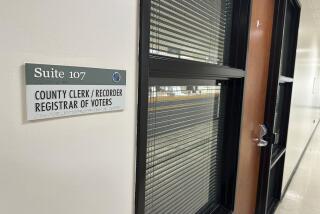Congress Reopening Mail Room
- Share via
WASHINGTON — As scores of trucks prepare to return from an irradiation facility in Lima, Ohio, congressional offices are girding for an onslaught of backlogged mail--a blizzard that could come just in time for Christmas.
All outside mail and package deliveries to Capitol Hill were halted Oct. 15 after a letter containing anthrax was opened by a staffer to Senate Majority Leader Tom Daschle (D-S.D.).
Now 147 trucks full of congressional mail are in Ohio to be sanitized before they are returned to Washington for distribution sometime in the next few weeks, officials said. In addition, 507 bags of mail that were seized by the FBI as crime scene evidence have tested negative for anthrax and are ready for irradiation. Mail sent in the last few weeks, after a quick trip to Ohio, has started to trickle in.
The delivery hiatus, the first in Congress’ history, is changing how the public communicates with lawmakers. Some wonder if those who flooded fax machines or learned to use e-mail will return to “snail mail” or convert to the new methods. Either way, no one suggests that the tradition of complaining to elected officials is dying off.
“Nobody would have imagined this would last so long,” said Emile Milne, an aide to Rep. Charles B. Rangel (D-N.Y.). Borrowing from the creed of postal workers, Milne added, “Neither rain nor sleet nor snow will stop the mail--but this guy Osama bin Laden has.”
Some congressional mail--about 65 bags’ worth--may never come back. That’s the mail confiscated by the FBI from the first week of the crisis and found to have traces of anthrax. Rep. Robert W. Ney (R-Ohio), chairman of the House Administration Committee, wants it burned. “Why truck it across state lines?” asked Jim Forbes, his director of communications.
The return of the mail is likely to contain surprises, including pleas for provisions on bills already passed. Rep. Nancy Pelosi (D-San Francisco) might get letters of congratulation. She was elected minority whip, the Democrats’ No. 2 leadership post, on Oct. 10, five days before mail stopped.
Pelosi’s office seems sanguine about the mail. Most of her tech-savvy constituents had switched to e-mail anyway, staffers said.
Not so the constituents of Rep. Adam B. Schiff (D-Burbank). “I think we’re going to get a ton of mail,” he said.
Mail is especially important for lawmakers whose districts are, as they say on Capitol Hill, competitive. Democratic Rep. Joseph M. Hoeffel represents Pennsylvania’s Montgomery County, an affluent swing district outside Philadelphia. His constituents are well educated, and staffers said they are not shy about conveying their views to their congressman, who they reelected last year with only 53% of the vote.
The sheer volume in some offices is daunting. California’s 34 million residents usually generate thousands of letters a day to each of the state’s two Democratic senators, staffers said.
Californians have responded well to the anthrax alternatives. The fax machine in Sen. Barbara Boxer’s office has been humming. Mail to her district offices in California has doubled. And e-mails to Boxer also are double what they were before the anthrax scare: as many as 14,000 a week.
Still, Boxer press secretary David Sandretti said, there will always be a place for the letter. “When somebody sits down at their kitchen table, licks that stamp and drops it in the mailbox, it is a considered opinion, and we take it seriously. It will always be welcome.”
Much of congressional mail, however, comes not from that lone voter but from business interests that have found clever ways to send mass mailings that read like they are from constituents in the district.
Many congressional staffers, like employees in the private sector, have personal purchases delivered at work. One bride reportedly still is awaiting her wedding photographs. And Scott Mulhauser of the Senate Aging Committee--who also is a first-year law school student--is doing classwork on a borrowed computer because his newly ordered laptop is stuck in the delivery backlog.
But it’s the constituent mail that is the biggest concern. Sen. Joseph I. Lieberman (D-Conn.), asked recently if the people he represents are upset by what some see as the government’s encroachment on civil rights, told reporters he wasn’t really sure, because the mail was so slow.
*
Times staff writer Richard Simon contributed to this report.
More to Read
Sign up for Essential California
The most important California stories and recommendations in your inbox every morning.
You may occasionally receive promotional content from the Los Angeles Times.










